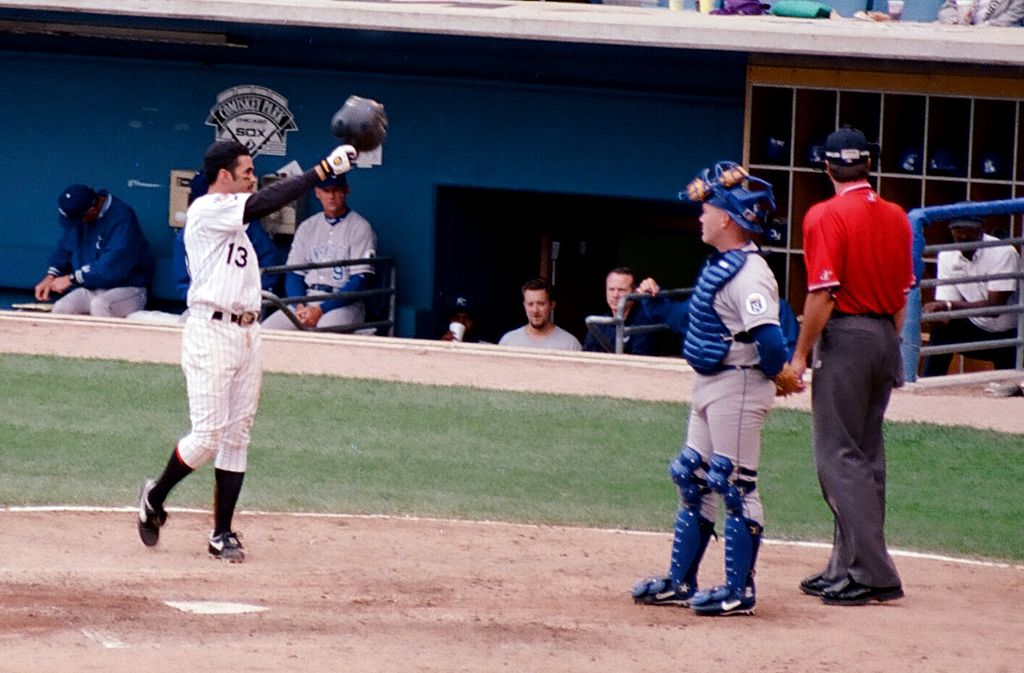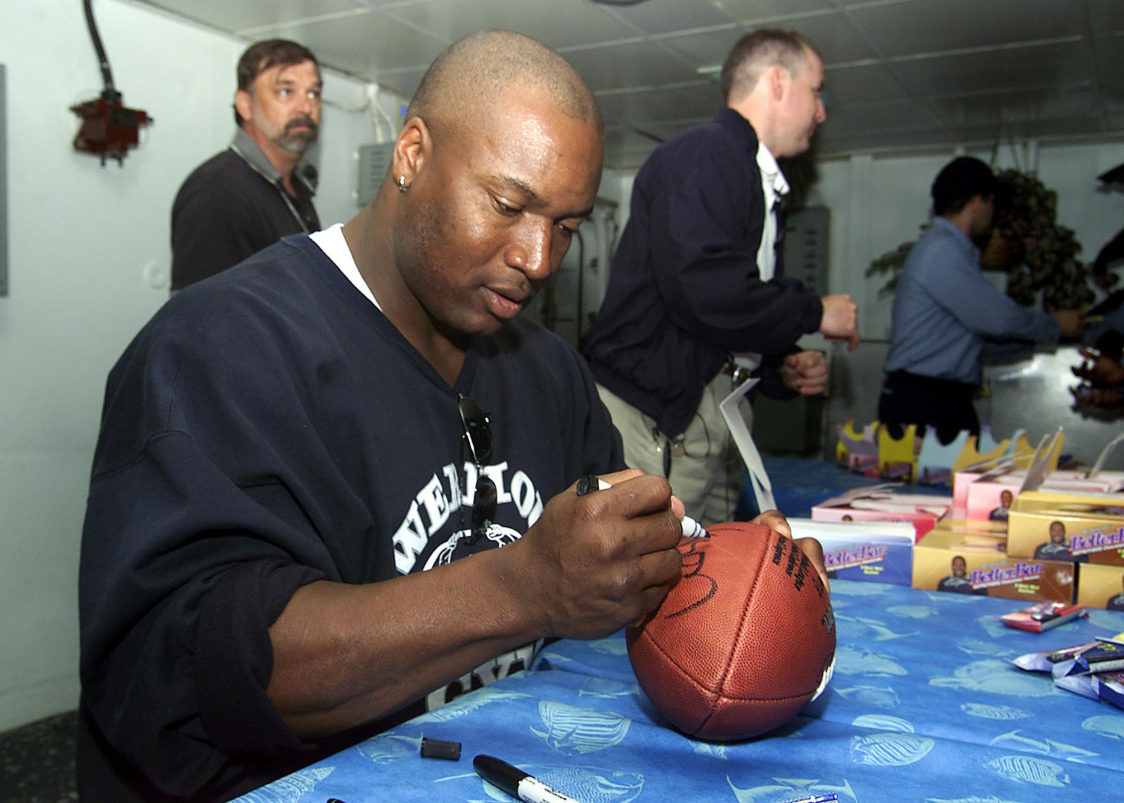As I walked through the White Sox dugout with a camera crew right behind me, my nerves wouldn’t let me forget that this was the first time I’d ever reported on a professional ballgame.
I expected a memorable night, but I had no clue that I was about to witness the breakthrough performance of Bo Jackson’s epic comeback.
Ironically, before the game even started, I had a moment with another Sox player that turned out to be prophetic. Or at least that’s how it looks in hindsight.
As I neared the steps up to the field, Sammy Sosa u-turned into the dugout and walked straight toward me. This was in 1991, six months before Sosa was traded to the Cubs. In fact, Sosa had just been called back up to the show after being sent down to Triple-A-ball months earlier.
Sosa game me a knowing nod, as if I’d been covering the Sox for years. I faked a confident nod back, and then for some reason asked: “Are ya ready, Sammy?”
I knew that Sosa wasn’t in the starting lineup that night, so it was kind of a stupid question. Nearly condescending. But he didn’t miss a beat, shooting back with the posture of a peacock: “I was born ready!”
He turned out to be right. After he was traded to the Northsiders he went on to hit 551 homers for them. Ouch.
But on this late summer night, it was Jackson who was center stage. And that would have been the case no matter how he played; the whole sports world was waiting to see if he still had it.
In January of that year, the Heisman winner and two-sport sensation sustained a brutal hip injury while running the ball for the LA Raiders. It was a split decision among doctors on whether Jackson would ever return to either professional football or baseball.
The Kansas City Royals decided the answer was no, and released him two months later to save themselves the $2.4 million they owed on his contract.
A few weeks after that, White Sox owner Jerry Reinsdorf took a risk and signed Jackson to a short-term deal. Jackson made his return to baseball in early September to play against — of all teams — the Royals.
He struggled out of the gate. In his first three games against KC that week, Jackson went 0 for 8 at the plate. While it was already a huge achievement to have rehabilitated his hip to the point where he was back in a major league uniform, with each failed at-bat, the question loomed larger.
I was there for Jackson’s fourth game, and he wasn’t accessible to the press beforehand. He knew that having to face the circus afterwards was more than enough.
It was an hour before first pitch and I had yet to get an interview with a Sox starter. I got my nerve up and asked future hall-of-famer Tim Raines if he’d answer a few questions. “Rock” was a quiet kind of guy who didn’t seek the spotlight, but I think he spotted the rookie in me, and graciously agreed.
I can’t remember a single word Tim Raines said that night. But it was a big relief to have that first interview under my belt. It would be airing on SportsChannel Chicago in a couple of days.
I was 24 years old when I lucked into this gig. An enterprising sportscaster named Pat Benkowski had created his own show called The Sports Spotlight. He rented the airtime, hired crews, sold the ads, reported on the games and then worked with editors to put it all together each week.
When I started working for Pat, I was mostly hauling gear into the stadiums. Back then, there were no digital devices to shoot on or wireless mics. You had to carry large cameras, lights, audio equipment, and heavy battery packs.
The toughest work nights were when we’d cover the Blackhawks in the old Chicago Stadium. The press had to sit up at the very top of the building — right next to the video replay officials. There were no elevators in the “old barn,” and lugging all of that gear up those steep staircases was akin to wearing leg weights.
On this night, Pat was sick, so he gave me my shot.
I had grown up in the 1970’s watching Sox players like Bobby Bonds, Dick Allen, Ron Santo and Bucky Dent. Now, 20 years later, I was striding the field in the newly built Comiskey Park amid the likes of Sammy Sosa, Tim Raines, Frank Thomas and Bo Jackson. It was surreal.
My crew and I settled into the ground-level box designated for TV cameras along the left field line. As I scanned the stadium crowd, my eyes felt like charged electrical sockets. Everything looked lit up. And then the Sox took the field.
In the bottom of the first, Jackson hit a little chopper toward third that drove in Robin Ventura. He was called safe at first, and just like that, Jackson had the first hit of his comeback. It was a bit anticlimactic, but it was official — and the South Side fans showed their appreciation.
The real fireworks came in the fourth inning. With two outs, the Sox sparked a surprise rally that just wouldn’t stop. They’d already scored two runs when Jackson stepped up to the plate with Robin Ventura and Warren Newsom on base. He cracked a two-run single, sending Royals starter Mark Gubicza to the showers.
This time, the crowd went wild. But the Sox weren’t done.
Royals relief pitcher Mark Davis walked the next three batters to load the bases. Up to the plate stepped Ozzie Guillen — the Sox shortstop who was carrying a .273 batting average and had hit only nine home runs over his seven seasons in the bigs.
I don’t remember the pitch that Storm Davis served up to Guillen, but I do remember the thunderous sound and vibration of that crowd when his grand slam cleared the wall. The place went nuts.

A 10-run inning — all of them scored after there were two down. Pretty rare. And, in this case, historic.
After the game, I found myself smack-dab in the middle of my first media scrum. TV photographers, including my guy Tony, were stepping over each other to get as close as they could to Bo Jackson’s locker.
With all of those veteran reporters around me, I didn’t even need to ask a question.
Jackson could have been smug with the media that day. He’d gone two for four, drove in three runs and silenced more than a few critics. At least temporarily.
Instead, he joked about Guillen’s dramatic blast:
“I got to enjoy that two-run single for about two minutes. He spoiled it for me!”
Minutes later, Guillen gave it back:
“Bo hasn’t hit a home run for us yet. I hope it doesn’t mess up my swing. If I start hitting home runs, the White Sox won’t have enough money to pay me.”
Looking back, the action of that game and the banter that followed seems a bit like a dream. I was so green — and it all happened so fast.
I started covering more pro sports for Benkowski, and eventually, I took a page out of his book and started my own radio shows — Hawks Weekly and Bulls Session.
Now I was interviewing NHL and NBA players up to four times a week at the stadium. Before the games, I was downstairs eating five-course dinners served to the media by the front office. And I had a press seat on the floor where we all got to watch Michael Jordan make history most nights.
Those were glorious times. And over the next couple years, I had the chance to interview just about every superstar in those two leagues.
But no other game stands out like that 11-2 Sox win on a cool September night nearly three decades ago.
Bo Jackson and Ozzie Guillen made damn sure I’d never forget it.


